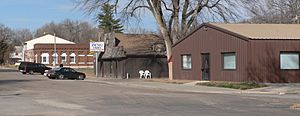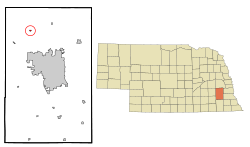Raymond, Nebraska facts for kids
Quick facts for kids
Raymond, Nebraska
|
|
|---|---|
|
Village
|
|

First Street in Raymond
|
|

Location of Raymond, Nebraska
|
|
| Country | United States |
| State | Nebraska |
| County | Lancaster |
| Area | |
| • Total | 0.13 sq mi (0.34 km2) |
| • Land | 0.13 sq mi (0.34 km2) |
| • Water | 0.00 sq mi (0.00 km2) |
| Elevation | 1,240 ft (380 m) |
| Population
(2020)
|
|
| • Total | 159 |
| • Density | 1,213.74/sq mi (466.85/km2) |
| Time zone | UTC-6 (Central (CST)) |
| • Summer (DST) | UTC-5 (CDT) |
| ZIP code |
68428
|
| Area code(s) | 402 |
| FIPS code | 31-40780 |
| GNIS feature ID | 2399050 |
| Website | http://lancaster.ne.gov/raymond/ |
Raymond is a small village located in Lancaster County, Nebraska, in the United States. It is part of the larger Lincoln area. According to the 2020 census, 159 people lived in Raymond.
History of Raymond
Early Settlers and the Village's Start
People started settling in the Raymond area around 1864. One of the first schools was a "subscription school." This meant families paid a fee for their children to learn. It was held in the home of Charles and Olive White.
In 1870, a dam was built on Oak Creek. This dam powered a grist mill, which was used to grind grain into flour. More people moved to the area because of the mill.
Even with people living there, the area didn't have an official name or town. In 1878, a post office opened nearby and was called "Orlando."
How Raymond Got Its Name
Raymond officially became a village in 1880. This happened when the railroad tracks were extended to that spot. The village was named after I. M. Raymond, who was an important official for the railroad company.
Growth and Challenges Over Time
In 1892, Raymond officially became an incorporated village. This meant it could have its own local government. A year later, a two-room school was built for the children.
Later, Raymond's school joined with other nearby school districts. A new high school was built near Agnew, Nebraska. However, younger students still attend elementary school right in Raymond.
The 20th century brought new challenges for Raymond. As cars became popular, people traveled on highways. Highway 79 was built about half a mile west of Raymond. This meant the village was not directly on the main travel route.
During World War II, the Lincoln Air Base was built nearby. Many factory jobs also became available in other places. This caused some people to move away from Raymond.
A New Era with Branched Oak Dam
Raymond saw a period of growth after 1970. This was when the Branched Oak Dam was built. The dam helped protect the village from floods.
It also created a large reservoir, which is a big artificial lake. This lake is now surrounded by the biggest recreational area in eastern Nebraska. It offers many fun outdoor activities for people to enjoy.
Geography of Raymond
Raymond is a small village in terms of its size. According to the United States Census Bureau, the village covers a total area of about 0.13 square miles (0.34 square kilometers). All of this area is land, with no water.
Population and People
Population Changes Over the Years
The number of people living in Raymond has changed over many years. Here is a look at the population counts from different censuses:
| Historical population | |||
|---|---|---|---|
| Census | Pop. | %± | |
| 1900 | 200 | — | |
| 1910 | 236 | 18.0% | |
| 1920 | 249 | 5.5% | |
| 1930 | 205 | −17.7% | |
| 1940 | 199 | −2.9% | |
| 1950 | 196 | −1.5% | |
| 1960 | 223 | 13.8% | |
| 1970 | 187 | −16.1% | |
| 1980 | 179 | −4.3% | |
| 1990 | 167 | −6.7% | |
| 2000 | 186 | 11.4% | |
| 2010 | 167 | −10.2% | |
| 2020 | 159 | −4.8% | |
| U.S. Decennial Census | |||
Raymond's Population in 2010
The census from 2010 showed that 167 people lived in Raymond. These people lived in 71 households, and 45 of these were families. The village had about 1,285 people per square mile. There were 76 housing units in total.
Most of the people in Raymond were White (95.8%). A small number were African American (0.6%) or Asian (1.2%). About 2.4% of the population identified as two or more races.
Households and Families
Out of the 71 households, about 28% had children under 18 living there. More than half (54.9%) were married couples living together. A small number of households had a single female or male parent. About 36.6% of households were made up of individuals living alone.
About 28% of all households had just one person living in them. About 11% of these single-person households were people aged 65 or older. The average household had 2.35 people. The average family had 2.93 people.
Age and Gender in Raymond
The average age of people in Raymond in 2010 was 45.2 years old.
- About 21.6% of residents were under 18 years old.
- About 7.2% were between 18 and 24 years old.
- About 21% were between 25 and 44 years old.
- About 42% were between 45 and 64 years old.
- About 8.4% were 65 years of age or older.
When it came to gender, 54.5% of the people in Raymond were male. The remaining 45.5% were female.
See also
 In Spanish: Raymond (Nebraska) para niños
In Spanish: Raymond (Nebraska) para niños
 | Lonnie Johnson |
 | Granville Woods |
 | Lewis Howard Latimer |
 | James West |

